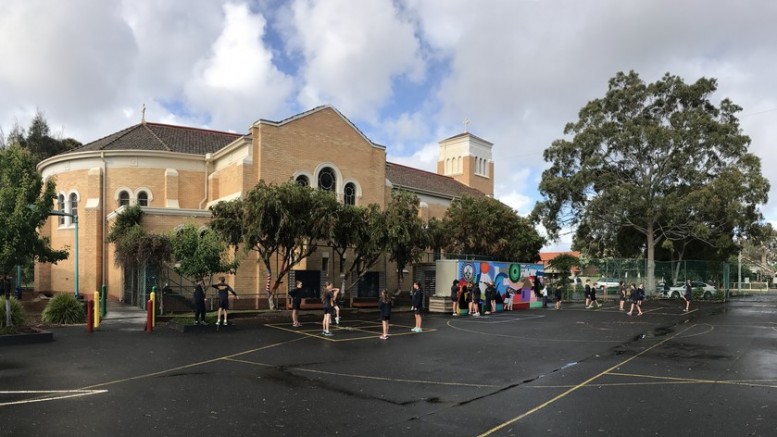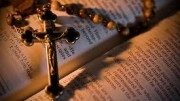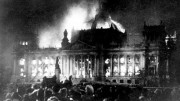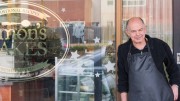When I contacted St Kevin’s Catholic parish in Ormond for this story I was given Rodney Dearing as the best person to meet for my interview. Stupidly I naturally assumed that he was the Parish Priest but soon discovered that Rodney is the retiring Pastoral Associative for the Catholic parishes of St Kevin’s in Ormond and St Patrick’s in Murrumbeena.
Rodney is a lay person who was employed by both the St Kevin’s and St Patrick’s Parishes to assist their priest, Father Paul, who started at both parishes in February 2017. Rodney has been involved with the church in this form of role for 14 years since 2004 and was identified as the person most capable to give me the background and history of the St Kevin’s parish. I meet with Rodney at the Parish Presbytery, which I found quite interesting, as despite my 54 years on the planet as a Catholic, I cannot ever recall setting foot in one. The surroundings were certainly humble enough which is what you would expect from an organisation that preaches the virtues of poverty.
Once we started Rodney certainly knew his facts about the Parish History.
St Kevins Primary School was opened in 1924 as an offshoot of Glenhuntly Parish, apparently, a number of Parishes in the area came from the Glenhuntly parish.
The Archbishop of that time, Archbishop Mannix had decided that he didn’t want children walking too far to school, so new schools were established throughout the district. While hard to imagine now, this was at a time shortly after World War One had finished and the country was recovering from that War’s catastrophic loss of life.
Much of the area then is what we know as the city of Glen Eira now, but would have resembled more of a farming district in 1924 rather than the bustling suburbs that we know now. It was also a time when owning a car was more of a luxury than a necessity and people were more likely to travel by foot, bike, public transport and even horse. So you can understand the Archbishop’s thinking.
In those days the school was a composite school and church. What is now the school hall, back then doubled as the classroom during the week and the church on weekends. The church and school were originally managed by brigandine nuns who were based out of the Star of the Sea convent in Brighton. To manage the parish the nuns used to catch the bus or walk to St Kevin’s.
In 1928 the St Kevin’s Parish was established in its own right. In between 1924 and 1928 a parish Priest from Glenhuntly would celebrate mass with the congregations at both Glenhuntly and Ormond, as well as other parishes. This changed in 1928 when the parish was established and St Kevin’s had engaged their own Parish Priest. The school hall was still used as the church on weekends and this continued until 1955 when the current church opened its doors. The Church was designed by prolific Catholic architect Cyril C Kelly who was also responsible for many other churches and building designs across Melbourne.
The construction of the church was completely funded out of the pockets of the parishioners and an interesting aside to the church’s construction is that the land wasn’t quite big enough to fit the church so the parish had to purchase part of the railyards behind it. Since then half the playground at St Kevin’s school and the tennis courts behind the church have been leased from the local council.
For people with little knowledge about the history of the church, this should be quite a revelation for those always calling for bodies like our churches, whatever their denomination to pay taxes. The building of this church and school was totally funded by parishioners without any impost on taxpayers while paying a lease back to council for the past 63 years.
As Rodney explains, people see the churches assets and automatically think how wealthy the Catholic Church is. What they need to understand however is that the Church is not going to be sold, they are not going to sell the school and if they have one they are not going to sell the St Vincent De Paul’s shop, they are all going to be used for the greater good. So the churches wealth is a matter of perception if you are not going to obtain a financial benefit from it.
At the end of the day, all parishes rely on their parishioners to operate, which is why they take up collections at each mass.
Rodney also points out is that these contributions made to the church are not tax-deductible and the church provides services outside of their faith services, such as St Vincent De Paul for the unemployed and homeless. How much money does the Church save the government in providing these services? Rodney was certainly building a convincing argument that would make for a good debate.
Rodney sees the justification for taxes on certain faiths that engage in commercial concerns, which is a different issue, but to tax groups such as the Catholic church on the income they receive that goes towards providing services to the community, is going too far. This is especially so when the government would otherwise have to raise taxes to provide these services themselves.
I would agree!
It also made me reflect that in these days of handouts and people looking for governments to provide for every need, how far we have moved away from our past generations. These communities contributed out of their own pockets and worked hard to raise funds all for the purpose of establishing things such as St Kevin’s Parish and primary school. They had a real sense of community and working towards a common good.
As Rodney points out, in that period, your Parish was the centrepiece of your community’s life, where sports clubs were established to bring their parishioners and communities together and different groups were formed to help the needy. The church back then was a very major part of people’s daily and weekly activities and lives, but that has all changed now and in Rodney’s opinion, we as a society are the poorer for it. These communities came together through faith, but they developed into so much more.
Back in this period, the natural time frame for a Priest at a Parish was 20 years, so once the St Kevin’s Parishioners had finished with the construction of the church they became busy with fund-raising and planning for a Presbytery for the Parish Priests. This was opened in 1964.
To complete this fund-raising, parishioners contributed two schillings per week and had delegated parishioners appointed who were responsible for knocking on the doors of local fellow parishioners to ensure they all contributed. No social media, no government handouts, just a willingness to make their church, their parish, their child’s school and their communities a better place for all.
As for St Kevin’s Primary school it currently has 90 students enrolled and Rodney attributes this small student number to the fact of the changing demographics of the area and how it is now more multi-cultural with different denominations and in the Ormond area, in particular, the demographic has a high population density of the Jewish faith.
He compares this to their other school in the parish in Murrumbeena at St Patricks that now has well over 300 students and has grown steadily. As time goes by demographics change.
Despite the small student numbers, Rodney thinks St Kevin’s is a great school community with great staff and a bright future.
At this point in our interview, I wanted to find out a little more about Rodney. I was keen to discover what drove a person like him to serve so faithfully a church that has been so maligned in recent history.
In 2002 Rodney had a fairly senior local government Human Resources job when he was retrenched and suddenly found himself unemployed. Rodney’s wife at this point encouraged him to follow his passion, which was a study of theology. In 2003 Rod allowed his wife to support them while he enrolled in theological college and started his study. Rodney is from Hoppers Crossing and in January 2004, Rodney’s Parish Priest, Father Barry approached him about serving St Kevin’s parish, where he was being transferred to
Rodney had been volunteering at Father Barry’s Hopper Crossing Parish and Father Barry knew he was studying Theology, so he called him up and headhunted Rodney for the pastoral role at St Kevin’s. So in May 2004, Rodney started at St Kevin’s Parish, initially working for the Ormond Parish, three days a week and a few years later began working full time for both Parishes at St Kevin’s and St Patrick’s. Rodney has been performing that role for the past ten years.
Rodney emphasises that full time doesn’t just mean Monday to Friday for 35 hours a week. Working for any parish requires whatever hours you need to do the job which can amount to over 70 hours a week. From Rodney’s perspective, you cannot see this role as a job, it’s a vocation, a passion for something you really believe in.
If you treat it as a job you will become very disillusioned very quickly as there are some aspects of the role that are difficult and aspects you couldn’t pay somebody to do, but there are also things that are extremely important to people and you can touch their lives in a significant and positive way through this role. Rodney especially gets a kick out of assisting people in discovering their faith and helping them through that process of becoming Catholic. Yes, believe it or not, there are still plenty of people attracted to the faith, Rodney advises me that at Easter this year over 300 people in Melbourne joined the Catholic Church, interestingly a positive story we never hear.
Rodney admits he will miss that now that he is retiring after fourteen years of frantic work. Many people think the Parish Priest and their support staff just organise and conduct mass and things such as confessions and that is it for the week.
The fact is that people’s engagement with faith, whatever denomination comes at a time of crisis with the most obvious one, for example, being a person’s death. In these times Paul, the local priest and the parish support people in these distressing time, show them compassion, reach out to loved ones and help them arrange the funeral and the service. This a regular event.
An important aspect of this time is to reacquaint people with their faith and helping them in their time of need. Baptisms and wedding are more joyous occasions, but funerals are when people are at their most vulnerable and in need of support both spiritually and emotionally. Other areas of crisis include homelessness, drug addiction, gambling, divorce etc. All people adversely affected by these sorts of crisis walk through the parish doors and when they do so they receive some good old fashioned human kindness.
The Parish runs a “Celtic café” each Thursday at 5 Dalny Road, between 5:00 pm to 7:00 pm other than school holidays. This is open to all denominations and is a way to allow people whether in crisis or not to come along and get to know members of the parish. This is not an evangelistic event, where you are hounded from pillar to post about becoming Catholic, it’s a simple gathering to any person of any faith to enjoy a hot drink and meal with others from within their community.
Rodney has a favourite saying from a Saint whom he can’t remember (it was actually St. Francis of Assisi), “Preach the gospel always, use words occasionally.”. In Rodney’s opinion, the strongest way to evangelise is by the way we act and the way we live our own lives, which gets other curious and can draw them to the faith.
Rodney identifies this intersection between faith and people and the challenges it can present, especially in these difficult times.
This presented the perfect Segway into one of the most difficult of subjects for any Catholic at the moment. Child Abuse. I didn’t want to get into the back and forth of what has been reported and brought into the spotlight, I simply wanted to find out how Rodney would convince anybody with reservations about the church due to the child abuse scenarios, that the church still was positive institution and had a positive message and role in today’s society.
You can sense, quite naturally, that this is a difficult issue for Rodney to address. You can also sense his devastation for the victims of this abuse and his genuine regret for what they went through.
His first point is that just because a person is a Catholic priest, that doesn’t make him a child abuser. He is a child abuser who happens to be a Catholic priest. Rodney does not steer away from the guilt or the shame of these priests who abused children but does point out that the percentage numbers in the Catholic church where about the same mark for most other organisations, yet it was the Catholic church that was wearing the bulk of the burden for this shame
His second point is that some other organisations stood before the Royal Commission into child abuse and despite having child abuse exposed within their organisation refused to change the way they operate in the belief that the way that they were operating was satisfactory. Against this, the and procedures in place to ensure the chances of this abuse happening again are remote in the extreme.
Rodney questions why the groups who have significantly higher rates of abuse than the Catholic Church and are not willing to make changes are not exposed in the media, while his church seems to be continually hunted by them.
In Rodney’s opinion, the more that faith groups (not just Catholic) try and stand up and say something, the more there are elements within our society, including the media, that think our faiths are not entitled to have an opinion.
To make his point Rodney provides the recent example of Israel Folau and his personal opinion of gays going to heaven. Rodney’s point isn’t that Israel was correct, in fact quite the opposite, his point is the reaction to it. Whether you agree or not with Israel Folau’s stance, many people share it, yet once he expressed it he faced outrage from across the nation and in the media, with many corporates trying to influence Rugby Australia to discipline him.
From Rodney’s perspective one of the great setbacks of the child abuse issue, other than that of the victims, is that it has many faiths and other organisations are now ducking for cover, not willing to have an opinion or to take a principled stand for fear of retribution from a hostile society. In times of falling morality that is a great shame.
I also wanted to discover how Rodney would address a person who was virulently against Christianity and having faith in Christ’s message.
Rodney’s answer was simple, he would have a conversation. In that conversation he would attempt to guide them to a transformational conversation, convincing them that life was greater than us and there was something greater than our own existence. The important aspect was to guide people to come to a deeper realisation for themselves that something else is there in our lives.
An area that proves to Rodney that people are craving for something to believe in is the evolution of new age thoughts and theories. Rodney’s concern is that people’s searching for “something more” can go the other way and people can be opened up to unsettling and even evil entities with their search.
Rodney has toured to many parts of the world and visited many churches and monuments to our many faiths on this planet, but the moment he felt closest God was when he was atop a mountain looking out over the snow-capped French Alps in all its beauty. Rodney’s point is you can find evidence of God everywhere; you just need to look for it. People who don’t see it, don’t want to.
This is a point I am in total agreeance with Rodney, except for me I don’t need the French Alps. I see God, for example, every time I look at my wonderful pet dog Kobe. Every time I feed him, take him for a walk, let him sniff a tree or fetch a stick or a ball, I just witness total joy and happiness in one of God’s creatures. God blessed my Kobe with a beautiful soul. Why, as humans, can we also not simply enjoy the simple things we have in this life, why do we find it so difficult, if we only lowered our vision, I think we could find evidence of God everywhere.
This was a great way to conclude our interview and on departing I couldn’t help but reflect on what a pity it is that we cannot get the story of genuine people such as Rodney out to the wider public. That’s what the Community Forum is all about. Well done Rodney and congratulations on your years of dedicated service towards your community.









Be the first to comment on "Rodney Dearing and St Kevin’s Parish – a reflection of faith and community"